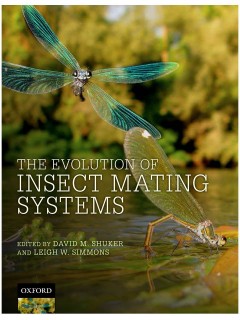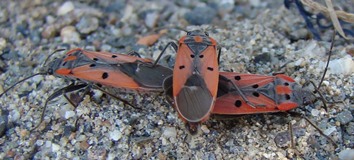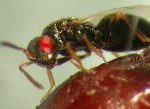Articles
Context-dependent use of visual cues in the shell selection behaviour of the hermit crab Pagurus bernhardus
Rimmer, J. E. V., Todd, C. D. & Shuker, D. M., Jul 2021, In: Behavioural Processes. 188, 5 p., 104414.
Research output: Contribution to journal › Article › peer-review
Environmental correlates of sexual signaling in the Heteroptera: a prospective study
Gourevitch, E. H. Z. & Shuker, D. M., 30 Nov 2021, In: Insect. 12, 12, 28 p., 1079.
Research output: Contribution to journal › Review article › peer-review
The definition of sexual selection
Shuker, D. M. & Kvarnemo, C., 7 Aug 2021, (E-pub ahead of print) In: Behavioral Ecology. Advance Article, 14 p.
Research output: Contribution to journal › Article › peer-review
A single pleiotropic locus influences the rate of hybridization between two sibling species of Lygaeus bugs
Balfour, V. L., Black, D. & Shuker, D. M., Nov 2020, In: Ecology and Evolution. 10, 21, p. 12224-12232 9 p.
Research output: Contribution to journal › Article › peer-review
Genomics of sex allocation in the parasitoid wasp Nasonia vitripennis
Pannebakker, B. A., Cook, N., van den Heuvel, J., van de Zande, L. & Shuker, D. M., 20 Jul 2020, In: BMC Genomics. 21, 14 p., 499.
Research output: Contribution to journal › Article › peer-review
Mating failure shapes the patterns of sperm precedence in an insect
Balfour, V. L., Black, D. & Shuker, D. M., 27 Jan 2020, In: Behavioral Ecology and Sociobiology. 74, 14 p., 25.
Research output: Contribution to journal › Article › peer-review
Same-sex sexual behaviour
Balfour, V. L. & Shuker, D. M., 16 Nov 2020, In: Current Biology. 30, 22, p. R1345-R1346
Research output: Contribution to journal › Article › peer-review
The rationality of decisions depends on behavioural context
Glaser, G. L., Miller, M. C., Healy, S. D. & Shuker, D. M., 5 Dec 2020, (E-pub ahead of print) In: Behavioural Processes. In-press, 104293.
Research output: Contribution to journal › Article › peer-review
Local mate competition modifies the costs of mating in a mostly monandrous parasitoid wasp
Boulton, R. A., Cook, N., Greenway, E. V., Glaser, G. L., Green, J. & Shuker, D. M., 5 Apr 2019, In: Behavioral Ecology. 30, 2, p. 417-425 9 p.
Research output: Contribution to journal › Article › peer-review
Validating the demethylating effects of 5-aza-2'-deoxycytidine in insects requires a whole-genome approach (A reply to Ellers et al.)
Cook, N., Parker, D. J., Tauber, E., Pannebakker, B. A. & Shuker, D. M., Sept 2019, In: American Naturalist. 194, 3
Research output: Contribution to journal › Article › peer-review
Other publications
The definition of sexual selection: a response to comments on Shuker and Kvarnemo
Shuker, D. M. & Kvarnemo, C., 9 Aug 2021, (E-pub ahead of print) In: Behavioral Ecology. Advance articles
Research output: Contribution to journal › Comment/debate › peer-review
Postcopulatory sexual selection when a female mates once
Dougherty, L. R., Simmons, L. W. & Shuker, D. M., Jun 2016, In: Animal Behaviour. 116, p. 13-16 4 p.
Research output: Contribution to journal › Comment/debate › peer-review
Mate choice and mating decisions: a response to comments on Dougherty & Shuker
Dougherty, L. R. & Shuker, D. M., Mar 2015, In: Behavioral Ecology. 26, 2, p. 326-327 3 p.
Research output: Contribution to journal › Editorial › peer-review
Mating failure
Greenway, E. V., Dougherty, L. R. & Shuker, D. M., 29 Jun 2015, In: Current Biology. 25, 13, p. R534-R536 3 p.
Research output: Contribution to journal › Editorial › peer-review
Evolution: conflict by the sexes, for the sexes
Shuker, D. M. & Cook, N., 1 Dec 2014, In: Current Biology. 24, 23, p. R1135-R1137 3 p.
Research output: Contribution to journal › Editorial › peer-review
Genetic variation in niche construction: a comment on Saltz and Nuzhdin
Shuker, D. M., Jun 2014, In: Trends in Ecology and Evolution. 29, 6, p. 303-304 2 p.
Research output: Contribution to journal › Letter › peer-review
Polyandry
Boulton, R. A. & Shuker, D. M., 16 Dec 2013, In: Current Biology. 23, 24, p. R1080-R1081 2 p.
Research output: Contribution to journal › Editorial › peer-review
Forward from the crossroads of ecology and evolution Introduction
Rowntree, J. K., Shuker, D. M. & Preziosi, R. F., 12 May 2011, In: Philosophical Transactions of the Royal Society. B, Biological Sciences. 366, 1569, p. 1322-1328 7 p.
Research output: Contribution to journal › Editorial › peer-review
Inclusive fitness theory and eusociality
Abbot, P., Abe, J., Alcock, J., Alizon, S., Alpedrinha, J. A. C., Andersson, M., Andre, J-B., van Baalen, M., Balloux, F., Balshine, S., Barton, N., Beukeboom, L. W., Biernaskie, J. M., Bilde, T., Borgia, G., Breed, M., Brown, S., Bshary, R., Buckling, A., Burley, N. T., & 117 othersBurton-Chellew, M. N., Cant, M. A., Chapuisat, M., Charnov, E. L., Clutton-Brock, T., Cockburn, A., Cole, B. J., Colegrave, N., Cosmides, L., Couzin, I. D., Coyne, J. A., Creel, S., Crespi, B., Curry, R. L., Dall, S. R. X., Day, T., Dickinson, J. L., Dugatkin, L. A., El Mouden, C., Emlen, S. T., Evans, J., Ferriere, R., Field, J., Foitzik, S., Foster, K., Foster, W. A., Fox, C. W., Gadau, J., Gandon, S., Gardner, A., Gardner, M. G., Getty, T., Goodisman, M. A. D., Grafen, A., Grosberg, R., Grozinger, C. M., Gouyon, P-H., Gwynne, D., Harvey, P. H., Hatchwell, B. J., Heinze, J., Helantera, H., Helms, K. R., Hill, K., Jiricny, N., Johnstone, R. A., Kacelnik, A., Kiers, E. T., Kokko, H., Komdeur, J., Korb, J., Kronauer, D., Kuemmerli, R., Lehmann, L., Linksvayer, T. A., Lion, S., Lyon, B., Marshall, J. A. R., McElreath, R., Michalakis, Y., Michod, R. E., Mock, D., Monnin, T., Montgomerie, R., Moore, A. J., Mueller, U. G., Noe, R., Okasha, S., Pamilo, P., Parker, G. A., Pedersen, J. S., Pen, I., Pfennig, D., Queller, D. C., Rankin, D. J., Reece, S. E., Reeve, H. K., Reuter, M., Roberts, G., Robson, S. K. A., Roze, D., Rousset, F., Rueppell, O., Sachs, J. L., Santorelli, L., Schmid-Hempel, P., Schwarz, M. P., Scott-Phillips, T., Shellmann-Sherman, J., Sherman, P. W., Shuker, D. M., Smith, J., Spagna, J. C., Strassmann, B., Suarez, A. V., Sundstrom, L., Taborsky, M., Taylor, P., Thompson, G., Tooby, J., Tsutsui, N. D., Tsuji, K., Turillazzi, S., Ubeda, F., Vargo, E. L., Voelkl, B., Wenseleers, T., West, S. A., West-Eberhard, M. J., Westneat, D. F., Wiernasz, D. C., Wild, G., Wrangham, R., Young, A. J., Zeh, D. W., Zeh, J. A. & Zink, A., 24 Mar 2011, In: Nature. 471, 7339, p. E1-E4 4 p.
Research output: Contribution to journal › Letter › peer-review
Reproductive interference
Burdfield-Steel, E. R. & Shuker, D. M., 21 Jun 2011, In: Current Biology. 21, 12, p. R450-R451 2 p.
Research output: Contribution to journal › Editorial › peer-review






 (pictured) and also sexual conflict and inter-species reproductive interference among five species of lygaeid seed bug. We mix behavioural experiments, ecological fieldwork, theoretical modelling, and genetic analysis to explore the evolutionary causes and consequences of variation in reproductive and sexual behaviour.
(pictured) and also sexual conflict and inter-species reproductive interference among five species of lygaeid seed bug. We mix behavioural experiments, ecological fieldwork, theoretical modelling, and genetic analysis to explore the evolutionary causes and consequences of variation in reproductive and sexual behaviour.